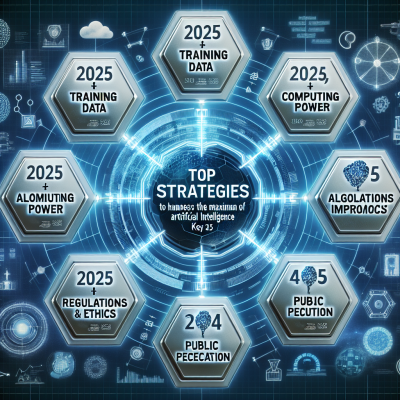

Unlocking the Future: 5 Ways to Harness AI’s Potential in 2025 and Beyond
As we enter a new era of digital transformation, artificial intelligence (AI) continues to evolve at breakneck speed. The coming years promise a wave of innovation that will reshape industries and redefine how companies operate. But with opportunity comes responsibility. To fully realize AI’s benefits, organizations must build strategies that are ethical, scalable, and aligned with long-term goals.
Here are five key ways businesses can harness AI’s full potential in 2025 and beyond.
1. Embed AI into Strategic Planning
AI is no longer a standalone initiative or siloed within IT departments. To drive sustainable growth, businesses must weave AI into the fabric of their strategic planning. This includes:
- Aligning AI goals with core business objectives such as revenue growth, cost optimization, and customer satisfaction.
- Creating cross-functional AI governance teams that include leaders from technology, operations, finance, and marketing to ensure alignment and accountability.
- Identifying high-impact use cases where AI can deliver measurable ROI — such as fraud detection, supply chain optimization, or predictive maintenance.
By grounding AI in organizational strategy, businesses can convert experimental use into enterprise-wide value.
2. Prioritize Responsible AI and Governance
With increased AI adoption comes the imperative to use it responsibly. Ethical AI isn’t just a compliance checkbox; it is essential for sustaining trust with stakeholders.
Key focus areas should include:
- Establishing transparent AI governance frameworks that define model usage policies, accountability mechanisms, and performance benchmarks.
- Auditing algorithms to mitigate bias, ensure fairness, and reduce operational risk.
- Educating teams and users about how AI works and how decisions are made, promoting a culture of fairness and transparency.
Companies that champion ethical AI are more likely to earn public trust—and prevent reputational and legal pitfalls.
3. Integrate Human-Centric Design
AI tools should be designed with the user in mind. Human-centric AI focuses on augmenting, rather than replacing, human capabilities.
To achieve this:
- Design AI interfaces that are intuitive and user-friendly, especially for non-technical users.
- Invest in the training and upskilling of employees so they can collaborate effectively with AI systems.
- Continuously gather user feedback to adapt AI systems to real-world needs and preferences.
When humans and machines work in harmony, productivity and innovation accelerate.
4. Maximize Data Preparedness
Data is the lifeblood of AI. However, many organizations are still grappling with fragmented and poor-quality data. Before deploying AI at scale, businesses should:
- Establish a solid data infrastructure with secure, centralized, and accessible data sources.
- Invest in data governance and quality management to ensure models are trained on clean, representative datasets.
- Leverage real-time data streams to power dynamic AI decision-making across the enterprise.
With well-managed data operations, AI can unlock actionable insights faster and more accurately.
5. Foster a Culture of Agility and Innovation
To stay ahead in 2025 and beyond, businesses must cultivate a culture that embraces experimentation and iteration. This involves:
- Creating innovation labs or AI centers of excellence where teams can prototype and validate new ideas quickly.
- Rewarding a fail-fast, learn-fast approach to AI development, encouraging risk-taking within a structured framework.
- Driving collaboration between data scientists, engineers, and business leaders to ensure technical feasibility aligns with business viability.
An agile mindset empowers companies to adapt faster to market shifts and launch AI initiatives that drive real change.
Final Thoughts: Prepare for the Intelligent Enterprise
AI is poised to redefine competitive advantage in the next decade. But success will depend on a company’s ability to scale innovation responsibly, embed AI deeply into its operations, and put people at the center of transformation. Organizations that integrate purposeful strategy with cutting-edge technology will be the ones that thrive in an AI-powered future.
Embracing these five foundational principles now will not only equip businesses to compete in 2025—it will position them as leaders in a rapidly evolving digital world.


Leave a Reply